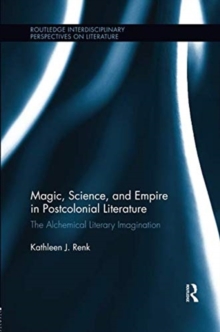Description
| Product ID: | 9781138547513 |
| Product Form: | Paperback / softback |
| Country of Manufacture: | GB |
| Series: | Routledge Interdisciplinary Perspectives on Literature |
| Title: | Magic, Science, and Empire in Postcolonial Literature |
| Subtitle: | The Alchemical Literary Imagination |
| Authors: | Author: Kathleen Renk |
| Page Count: | 184 |
| Subjects: | Literary studies: postcolonial literature, Literary studies: post-colonial literature, Biology, life sciences, Educational: Sciences, general science, Biology, life sciences, Educational: Sciences, general science |
| Description: | This book examines the ways in which contemporary British and British postcolonial writers in the after-empire era draw connections between magic (defined here as Renaissance Hermetic philosophy) and science. Writers such as Tom Stoppard, Zadie Smith, and Margaret Atwood critique both imperial science, or science used in service to empire, and what Renk calls "imperical science," a distortion of rational science which denies that reality is holistic and claims that nature can and should be conquered. In warning of the dangers of imperical science, these writers restore the connection between magic and science as they examine major shifts in scientific thinking across the centuries. They reflect on the Copernican Revolution and the historic split between magic and science, scrutinize Darwinism, consider the relationship between Victorian science and pseudo-science, analyze twentieth-century Uncertainty theories, reject bio/genetic engineering, call for a new approach to science that reconnects science and art, and ultimately endeavor to bring an end to the imperial age. Overall, these writers forge a new discourse that merges science with the arts and emphasizes a holistic philosophy, a view shared by both Hermetic philosophy and recent scientific theories, such as chaos or complexity theory. Along with recent books that focus on the relationship between contemporary literature and science, this work focuses on contemporary British literature’s critique of science and the ways in which postcolonial literature addresses the relationship between magic, science, and empire. This book examines the ways in which contemporary British and British postcolonial writers in the after-empire era draw connections between magic (defined here as Renaissance Hermetic philosophy) and science. Writers such as Tom Stoppard, Zadie Smith, and Margaret Atwood critique both imperial science, or science used in service to empire, and what Renk calls "imperical science," a distortion of rational science which denies that reality is holistic and claims that nature can and should be conquered. In warning of the dangers of imperical science, these writers restore the connection between magic and science as they examine major shifts in scientific thinking across the centuries. They reflect on the Copernican Revolution and the historic split between magic and science, scrutinize Darwinism, consider the relationship between Victorian science and pseudo-science, analyze twentieth-century Uncertainty theories, reject bio/genetic engineering, call for a new approach to science that reconnects science and art, and ultimately endeavor to bring an end to the imperial age. Overall, these writers forge a new discourse that merges science with the arts and emphasizes a holistic philosophy, a view shared by both Hermetic philosophy and recent scientific theories, such as chaos or complexity theory. Along with recent books that focus on the relationship between contemporary literature and science, this work focuses on contemporary British literature’s critique of science and the ways in which postcolonial literature addresses the relationship between magic, science, and empire. |
| Imprint Name: | Routledge |
| Publisher Name: | Taylor & Francis Ltd |
| Country of Publication: | GB |
| Publishing Date: | 2018-02-06 |
